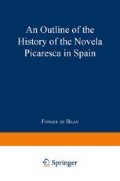Abstract
The story is bulky enough to satisfy the most eager reader, and insipid enough to make its chief merit consist in two facts therein demonstrated; namely, that the Spanish language was very popular outside of Spain, being studied and even written by foreigners, and also, that it is possible for a foreigner to learn Spanish well enough to write books in it.
Access this chapter
Tax calculation will be finalised at checkout
Purchases are for personal use only
Notes
See about his works, Adolfo de Castro, Introduction to vol. II of Poetas líricos de los siglos XVI y XVII (Riv., 42), p. XXXIV. Of the Enriquez de Castro, Gallardo (no. 2821) mentions an edition of Paris, viuda de Matias Gillemont, 1612, 877 pages. This probably is a mistake for that of Paris, 1617, viuda de Matias Guillemot, 879 pages, which is generally considered the first (see Salvá, no. 1875) and only edition, though Brunet says Nicolas Antonio mentions one of 1621, which according to Salvá (l. c.) is not in N. Antonio.
The Engaños de este siglo, Paris, 1615 (see Ticknor, Catala) is a well-written, but indecent, little book, containing an endless series of women and men who deceive each other. It is characteristic of the times that Ticknor’s copy lacks the pages 265–266, which probably were torn out by some pious person because they contained a remark against the “derecho de asilo” of churches, while the rest of the volume was left for the edification of its readers. I cannot agree entirely with A. de Castro as to the correctness of the language of the Engaños (see A. de Castro, l. c). No Spaniard, it seems to me, would have written as a conclusion to a book: “suplícote de no tener á mal si cojo las de villa Diego y te dexo á muy buenas noches.” The Enriquez de Castro seems more nearly correct; the fact is, I have not read the book with strict attention. Of the Enriquez de Castro, after almost nine hundred pages, the author promises a second part, which fortunately never appeared. The cost of the book in Madrid is never below 300 rs.; a fine copy costs even 400.
Rights and permissions
Copyright information
© 1903 Springer Science+Business Media Dordrecht
About this chapter
Cite this chapter
De Haan, F. (1903). Enriquez de Castro, by Loubayssin de Lamarca. In: An Outline of the History of the Novela Picaresca in Spain. Springer, Dordrecht. https://doi.org/10.1007/978-94-017-6318-9_11
Download citation
DOI: https://doi.org/10.1007/978-94-017-6318-9_11
Publisher Name: Springer, Dordrecht
Print ISBN: 978-94-017-5849-9
Online ISBN: 978-94-017-6318-9
eBook Packages: Springer Book Archive

